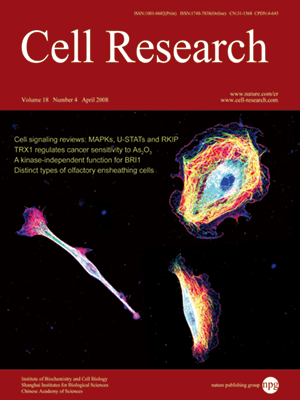
Volume 18, No 4, Apr 2008
ISSN: 1001-0602
EISSN: 1748-7838 2018
impact factor 17.848*
(Clarivate Analytics, 2019)
Volume 18 Issue 4, April 2008: 491-499
ORIGINAL ARTICLES
Estradiol-17β protects against hypoxia-induced hepatocyte injury through ER-mediated upregulation of Bcl-2 as well as ER-independent antioxidant effects
Min Young Lee1, Sun Chul Jung1, Jang Hern Lee2 and Ho Jae Han1
1Department of Veterinary Physiology, College of Veterinary Medicine, Biotherapy Human Resources Center (BK21), Chonnam National University, Gwangju 500-757, Korea
2Department of Veterinary Physiology, College of Veterinary Medicine, Seoul National University, Seoul 151-742, Korea
Correspondence: Ho Jae Han(hjhan@chonnam.ac.kr )
Although many previous studies have suggested that estrogen functions as a cytoprotective agent under oxidative stress conditions, the underlying mechanism by which this effect is exerted remains to be elucidated. This study assessed the effects of estradiol-17β (E
2) (10
-8 M) on hypoxia-induced cell injury and its related signaling in primary cultured chicken hepatocytes. Hypoxic conditions were found to augment the level of DNA damage and to reduce cell viability and the level of [
3H]-thymidine incorporation, and these phenomena were prevented through treatment with E
2. Hypoxia also increased caspase-3 expression, but showed no evidence of an influence on the expression of Bcl-2. However, E
2 induced an increase in the level of Bcl-2 expression under hypoxic conditions and reduced the level of caspase-3 expression. The effects of E
2 on Bcl-2 and caspase expression were blocked by ICI 182780 (E
2 receptor (ER) antagonist, 10
-7 M). In addition, hypoxia resulted in an increase in the intracellular reactive oxygen species (ROS) generated. These effects were blocked by E
2, but not by E
2-BSA and ICI 182780. Hypoxia also activated p38 mitogen-activated protein kinase (MAPK), c-JUN N-terminal kinase/stress-activated protein kinase (JNK/SAPK) and nuclear factor-κB (NF-κB). These effects were blocked by E
2, but not by ICI 182780. The inhibition of p38 MAPK and JNK/SAPK blocked NF-κB activation. In conclusion, E
2 was found to protect against hypoxia-induced cell injury in chicken hepatocytes through ER-mediated upregulation of Bcl-2 expression and through reducing the activity of ROS-dependent p38 MAPK, JNK/SAPK and NF-κB.
Cell Research (2008) 18:491-499. doi: 10.1038/cr.2008.42; published online 1 April 2008
FULL TEXT | PDF
Browse 1889


